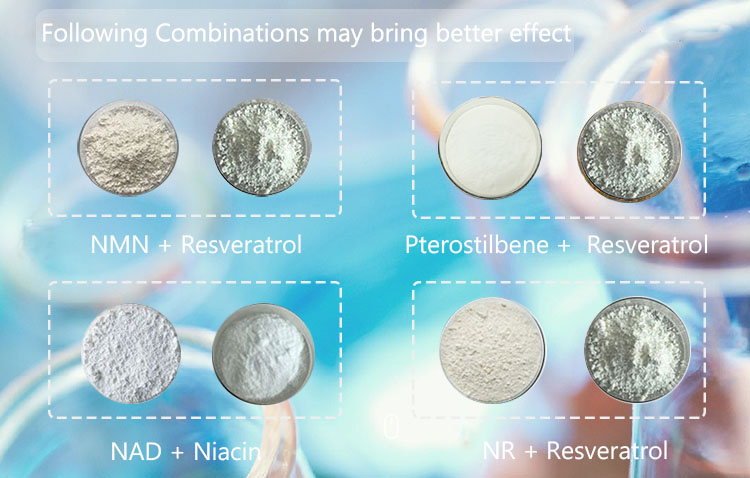Pterostilbene is a natural compound that belongs to a class of chemicals known as stilbenes, and it is closely related to resveratrol, a compound found in red grapes and wine. Pterostilbene has gained attention for its potential health benefits, but its effects and efficacy are still being studied. Here are some of the potential effects and efficacy of pterostilbene:
1.Antioxidant Properties:
Pterostilbene is known for its antioxidant properties, which means it can help neutralize harmful free radicals in the body. This may contribute to its potential benefits for reducing oxidative stress and protecting cells from damage.
2.Cardiovascular Health:
Some studies have suggested that pterostilbene may have a positive impact on heart health. It may help reduce blood pressure, lower cholesterol levels, and improve the function of blood vessels. These effects could potentially lower the risk of cardiovascular diseases.
3.Cognitive Function:
Pterostilbene has been investigated for its potential role in supporting cognitive function. It may have neuroprotective properties, which could help protect brain cells and potentially enhance memory and cognitive performance. However, more research is needed to confirm these effects in humans.
4.Anti-Inflammatory Effects:
Pterostilbene may have anti-inflammatory properties, which can be beneficial in reducing chronic inflammation and associated health issues. Chronic inflammation is linked to various diseases, including cancer, diabetes, and cardiovascular disease.

5.Anti-Cancer Potential:
Some studies have explored the potential anti-cancer properties of pterostilbene. It may inhibit the growth of cancer cells and induce apoptosis (programmed cell death). However, the research in this area is still in its early stages, and more studies are needed to establish its effectiveness against different types of cancer.
6.Blood Sugar Control:
Pterostilbene may help regulate blood sugar levels, making it of interest to individuals with diabetes or those at risk of developing the condition. It may improve insulin sensitivity and reduce glucose levels.
It’s important to note that while pterostilbene shows promise in various areas of health, research is ongoing, and many studies have been conducted in animals or in vitro (outside the body). Human clinical trials are needed to establish its efficacy and safety for specific health conditions.
Pterostilbene is available as a dietary supplement, and its use should be discussed with a healthcare professional, especially if you have existing medical conditions or are taking other medications. Like any supplement, it should be used in moderation, and its effects may vary from person to person.
Adverse effects of Pterostilbene
Pterostilbene is a natural compound found in some plants, including blueberries, grapes, and certain tree species. It is often considered a phytochemical with potential health benefits due to its antioxidant and anti-inflammatory properties. However, like many compounds, pterostilbene may have adverse effects in some individuals, especially when consumed in high doses or in supplement form. Here are some potential adverse effects of pterostilbene:
Gastrointestinal Issues: Some people may experience digestive problems such as diarrhea, stomach cramps, or nausea when taking pterostilbene supplements.
Drug Interactions: Pterostilbene may interact with certain medications. It can potentially increase the effects of anticoagulants (blood thinners) and antiplatelet drugs, which may increase the risk of bleeding. If you are taking these medications, consult with a healthcare professional before adding pterostilbene to your regimen.
Hypotension: Pterostilbene may have a mild blood pressure-lowering effect. This can be beneficial for those with hypertension, but it may cause low blood pressure (hypotension) in some individuals. If you have low blood pressure or are taking medications to lower blood pressure, you should monitor your blood pressure and consult with a healthcare provider before using pterostilbene supplements.
Allergic Reactions: While rare, some individuals may experience allergic reactions to pterostilbene. If you develop symptoms such as itching, rash, swelling, or difficulty breathing after taking pterostilbene, discontinue use and seek medical attention.

Liver and Kidney Health: Some studies suggest that very high doses of pterostilbene might have potential adverse effects on liver and kidney health. However, this is an area of ongoing research, and the significance of these effects is not fully understood.
It’s important to note that pterostilbene is generally considered safe when consumed in small to moderate amounts through dietary sources, such as blueberries and grapes. Most of the adverse effects mentioned above are associated with high-dose supplementation.
If you are considering using pterostilbene supplements for their potential health benefits, it’s advisable to consult with a healthcare professional before starting any new dietary supplement regimen, especially if you have any pre-existing medical conditions or are taking medications. They can provide guidance on dosages and potential interactions, ensuring your safety and well-being.
